Fr. Lawrence Fernandes: Priestly Journey from Moodubelle to Allahabad as a Missionary, Educationist and Writer
By Dr. Eugene DSouza
Bellevision Media Network
Udupi, 05 Aug 2022: The St. Lawrence Parish, Moodubelle has been a cradle of religious vocations. Since its inception in 1910, for the last one century and a decade, the parish has been providing inspired and dedicated youngsters to follow the religious vocation as priests and nuns who have been serving as missionaries not only within Karnataka but also north India and even abroad. A large number of Belleans serve in different dioceses of north India as missionaries working in parishes, schools and other institutions. Fr. Lawrence Fernandes, hailing from Kattingeri-Moodubelle was inspired to join the Allahabad Diocese and during his tenure as a priest in the diocese he served in many parishes, schools and mission centres. He acquired higher education and headed schools as principal. Using his writing skills, he brought out highly acclaimed five volumes regarding the School Administration. Besides he wrote other books on spiritual subjects and a book of genealogy. This is the story of the priestly journey of Fr. Lawrence from Moodubelle to Allahabad as a Missionary, Educationist and Writer.
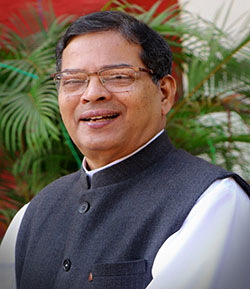
Fr. Lawrence Fernandes belonged to a God-fearing family of Moodubelle in Udupi District. His ancestors belonged to Goa. They had migrated to the Coastal Karnataka during the 17th century A.D. His great grandfather had settled down in Moodubelle in around 1800 A.D. His father Andrew Fernandes married Rogina Fernandes in 1937. Fr Lawrence was born on 5th August 1951 as the fifth child among seven children, four sons and three daughters. He was baptized at St. Lawrence Church Moodubelle. Fernandes’ family lived at Kudru house, Kattingeri village. The Kudru House is also known as Island House because during rainy season flood water used to surround their house. The Fernandes family pursued agriculture for livelihood.
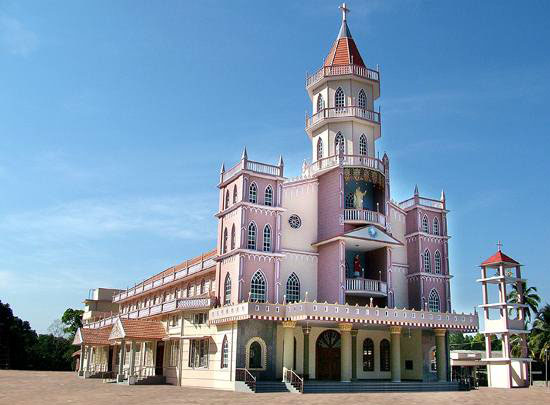
Between 1945 and 1965 the financial position of Fernandes’ family was not very sound. Besides this, the family did not give much importance to formal education. However, Fr. Lawrence was allowed to pursue his studies rather than render help in the work of agriculture. During those hard times two of his older brothers had moved out to Mumbai in search of jobs.
Fr. Lawrence had his primary education in the Church Aided Higher Primary School. Thereafter he completed his high school studies in St. Lawrence High School, Moodubelle in 1969. During school studies, Fr. Faustine Alva (Fr. Hugo Faustine Alva, Allahabad Diocese) motivated his friend Andrew Fernandes, father of Lawrence to send one of his sons to the seminary. As a dedicated missionary, Fr. Faustine Alva prevailed upon Andrew Fernandes to give his consent to his request. The lot fell on Lawrence and he was quietly being prepared to renounce the worldly life and dedicate himself to priestly vocation. The impact of their influence was so great that Lawrence began to dream about becoming a priest.
During his studies at school, Fr. Lawrence came to know Fr. Charles Alva (Fr. Dhiranand Bhatt), younger brother of Fr. Hugo Faustine Alva and Fr. Sebastian Monis (Padubelle). These towering personalities, namely, Fr Faustine, Fr Dhiranand and Fr. S. Monis left an impression on him that finally ended up in his making a decision to join the Diocese of Allahabad. Besides these, he also gives credit to Fr. V.G.F. Rego, the then Parish Priest, Fr. Sylvester Vaz, assistant PP, Boniface Barboza (Primary School Headmaster) and William D’Sa (Primary School teacher) and others for guiding him and inspiring him to join seminary and become a priest.
Vocation to priesthood is a gift of God nurtured by the inspiration and encouragement of family members and relatives. His call to priesthood came when he was in the school as mentioned above. Since he was physically not very healthy and was often falling sick his mother was skeptical of his staying in the seminary. Halfheartedly she encouraged him to go to the seminary and at the same time she told him that if he found it difficult to stay in the seminary he could come back home.
Having made up his mind to join the seminary and work in the Allahabad Diocese, Lawrence moved to Lucknow, U.P. for undergoing initial training in St. Paul’s Minor Seminary Dilkusha, Lucknow which he successfully completed in 1972. While in the minor seminary, he also completed Intermediate Course from the Government Inter College Husainabad, Lucknow. Thereafter, he studied Philosophy in St. Joseph’s Regional Seminary, Allahabad. While in the seminary, apart from regular studies and activities he used to participate in games such as basket ball, football and volleyball. In the course of his seminary days, during one of the summer vacations (1974) he attended a course in the Hindustani Music School at Pachmarhi, M.P. conducted by Fr. Vijayanand. Learning music was not easy for him as he was not good at singing. However, he succeeded in clearing his second year of Music Course.
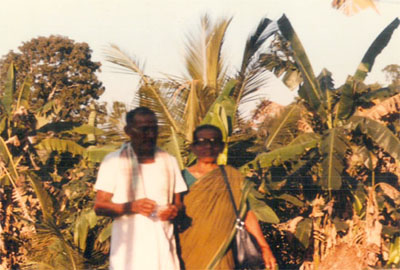
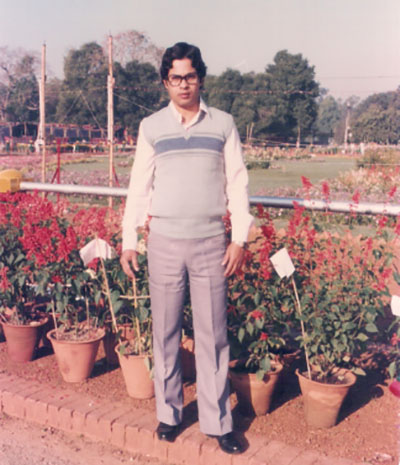
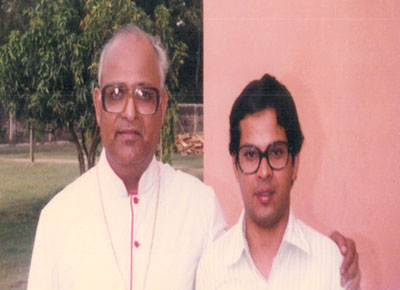
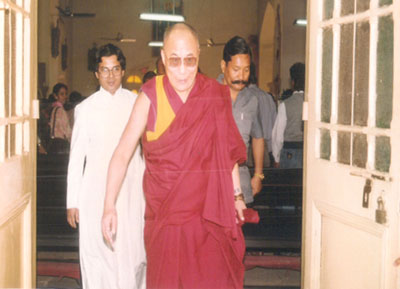
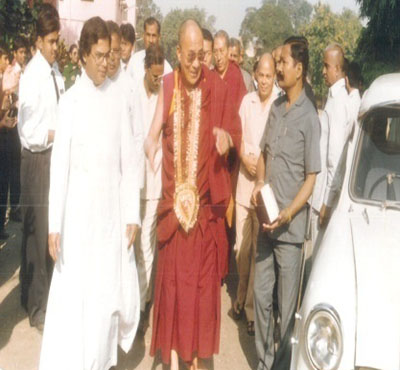
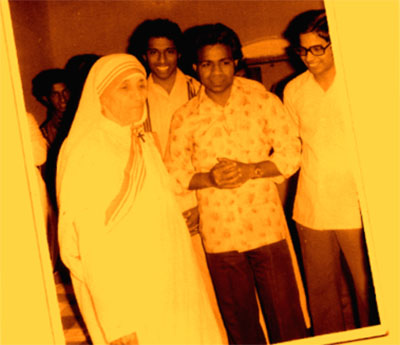
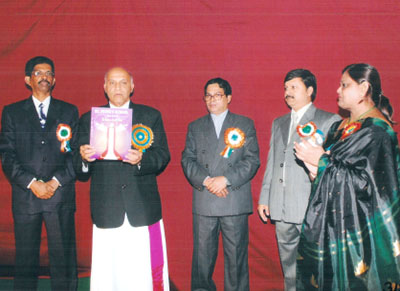
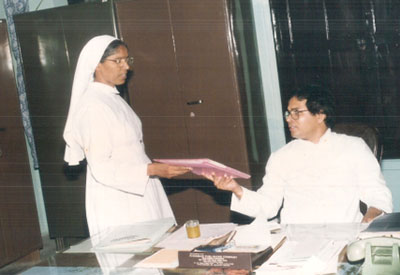
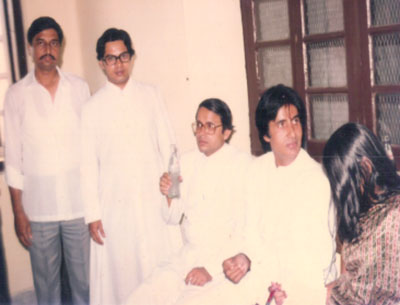
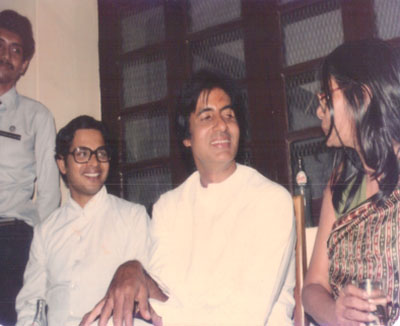
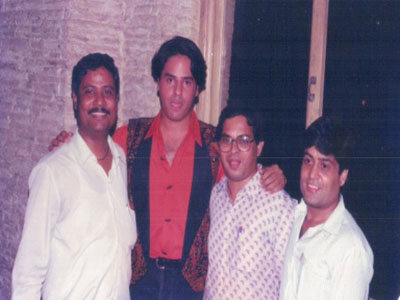
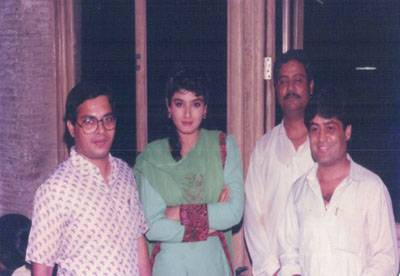
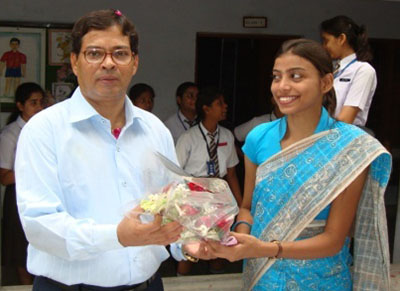
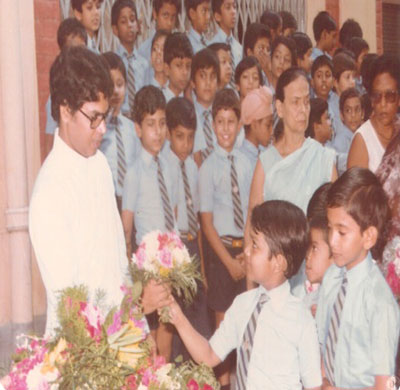
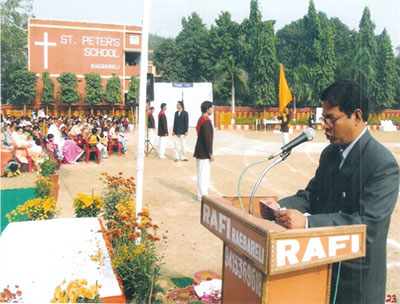
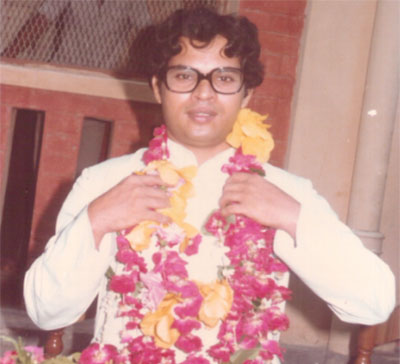
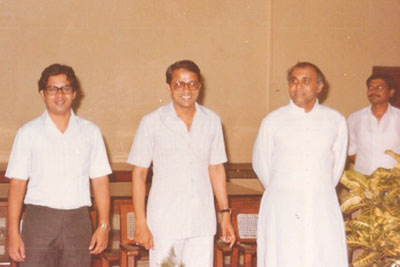
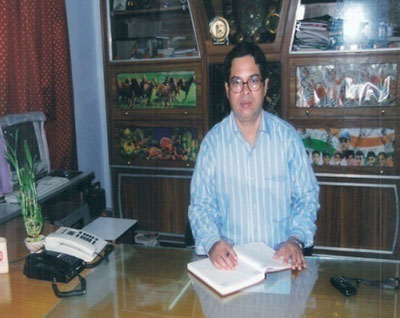
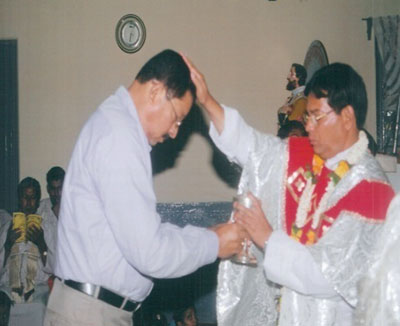
After completing the course in Philosophy in St. Joseph Regional Seminary Allahabad he was sent to do one years’ regency at St. Peter’s Church Raebareli. During his regency he was placed under the guidance of Fr. Anacletus D’Souza who lived an exemplary life. As a true missionary, Fr. Anacletus was known for his humility, sincerity, compassion and missionary zeal.
Having successfully completed his regency, Fr. Lawrence continued priestly training and did four years long theological studies at St. Joseph’s Regional Seminary, Allahabad from 1976 to 1980 and was ordained a priest at St. Joseph’s Cathedral, Allahabad by Rt. Rev. Baptist B. Mudartha on 13th April 1980.
As a seminarian Fr. Lawrence was known for hard work, simplicity and unassuming ways. With his weak health he always tried to balance between discipline and work. Through his interaction with the priests of the diocese he got himself acquainted with most of the places, mission stations, churches and other institutions in the diocese of Allahabad. He found the task very challenging and difficult. Many parishes and institutions were problem ridden and some of them were financially poor. Despite these reported difficulties he had made up his mind to brave up whatever came on his way. With this mindset he had set out to serve and work in the diocese of Allahabad in whatever capacity that he would be entrusted with.
After the priestly ordination Fr. Lawrence was sent for a short duration to Mudilla Mission station in the district of Sultanpur, U.P. This Mission station had more fields in number to cultivate than Catholics to cater for. However, the missionary zeal and desire to serve and proclaim God’s Word kept him going.
Realizing that self-education is one of the solutions to develop skills to interact with people, render help to solve their problems as well as to hold an intelligent conversation and dialogue with non-Christians, Fr. Lawrence took initiative to complete his graduate studies and acquired B.A. degree from Sultanpur, K. N. I. Degree College which was affiliated to the Avadh University, Faizabad (Ayodhya) in U.P.
From Mudila Mission Station Fr. Lawrence was deputed to Pratapgarh, a mission station for six months. Thereafter he went to St. Patrick’s Church, Kanpur as Assistant Parish Priest and to St. Aloysius High School as helper. During those years he completed his Master’s degree in English Literature from the Kanpur University. After completing three years in St. Patrick’s Church he went to St. Joseph’s College, Allahabad for three years. Having an interest in teaching Fr. Lawrence undertake the B.Ed. course from K. N. I. Institute Sultanpur which he completed in 1989. After securing a B.Ed. degree he was posted as Principal of St. Aloysius High School and as Assistant at St. Patrick’s Church, Kanpur. Having completed eight years in St. Aloysius High School he was sent to St. Xavier’s Church Robertsganj, Sonebhadra as the Parish Priest and as Principal of St. Xavier’s School. On completing seven years there he was shifted to St. Peter’s Church, Raebareli as the Parish Priest and as Principal of St. Peter’s School where he served for nine years. His last posting as Parish Priest and Principal was at Jagdishpur in the district of Amethi, U.P.
In the Parochial and Catholic Education Ministry
Fr. Lawrence Fernandes, 42 years a priest, actively served in the Mission Stations, Parishes and Schools of Allahabad Diocese. Currently he is the Diocesan Education Director (2022) and oversees the functioning of all the schools of the Diocese of Allahabad.
Besides his priestly duties and responsibilities, Fr. Lawrence was inspired and then developed a passion to put down some of his thoughts, ideas and experiences in writing. Writing books is a hard work. Books are written with great amount of focus, dedication, time and reflection.
Books written by Fr. Lawrence Fernandes
Fr. Lawrence Fernandes within a span of 17 years (2005 - 2022) has written 9 books. Besides these nine books, he has also written a book on Governance of Schools of Allahabad Diocese.
Encouraged by his family members and his cousin brother late Mr. Paul Fernandes, Fr. Lawrence ventured out to compile a genealogical family record or “Family Tree” comprising of names of Fernandes’ clan from the year 1800A.D. down to the year 2005. It was a great and challenging project. The family genealogical records remained abstract, but the family stories and their spiritual history were real.
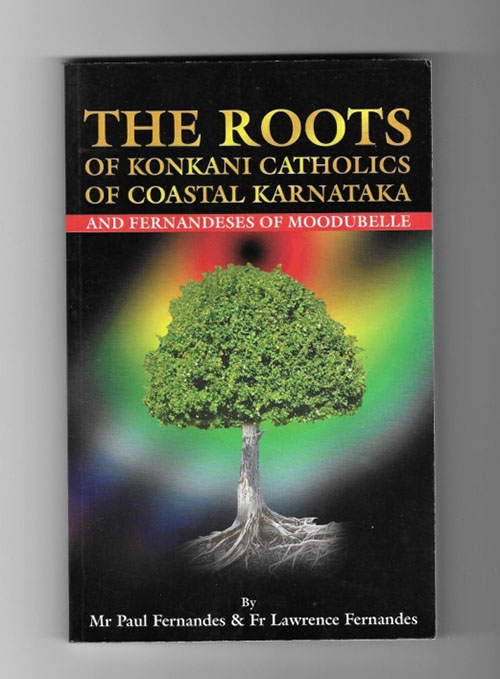
The book, “The Roots of Konkani Catholics of Coastal Karnataka” is a family document of 9 generations of Fernandes clan of Moodubelle, Shirva, Kalathur and Kalyanpur of Udupi District, State of Karnataka. This document tracks and scans down over 1400 descendants by name and their family roots from the year 1800 to 2005 A.D. It also documents their roots of spiritual faith in Christ, their history of migration into coastal Karnataka, their hardships, persecutions, settlement and their steady progress up to the year 2005. This book is co-authored by Fr. Lawrence Fernandes and by his cousin late Paul Fernandes. It is a great treasure in the form of a ‘Family Document or Family Tree.”

The book, “Jesus Christ the Fountain of Living Water” is a compelling explanation which tells the readers that Jesus is the giver of Eternal Life. The book convinces the reader that Jesus is the only Hope of this tossed and ripped apart between conflicting ideological currents such as materialism, relativism, agnosticism and individualism. People of the world are to quench their spiritual thirst in Jesus Christ who has made available “Eternal Life” to all through his atoning sacrificial death on the cross and then resurrection from the dead. This book strengthens the roots of one’s faith in Jesus.
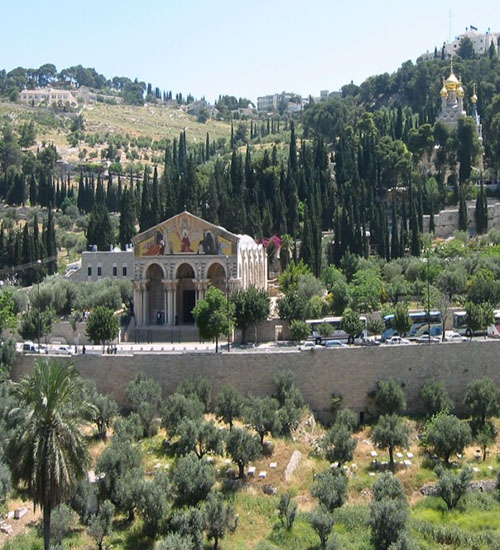
“The Land of the Book, The Holy Land” is an account of the pilgrimage to the Holy Land undertaken by the author of this book and about the history of Israel. The Land of Israel or the Promised Land is considered to be Holy. Jews inhabited this piece of land in the Middle East for many centuries. The entire storyline of the Bible is about Israel, the Jewish people and the Messiah. At present this tiny piece of land has become the battleground of Jews, Muslims and Christians all claiming it as their historical land. In this sacred space or Holy Land, Jews and Christian faiths believe God entered into a relationship with human race.

The central message of the book, “You Are Fearfully and Wonderfully Made” is that, by God’s grace, a transformed and meaningful life beyond the tyranny of ego is possible. Knowledge of God and knowledge of true self are like inter-connected rooms. No matter whichever room you enter first, it will lead you to the other. All who read this book may receive inspiration and help to undertake the challenging journey to self-discovery and experience the joy and freedom of living in Christ-Consciousness!
Books written on School Administration
Fr. Lawrence Fernandes using his wide range of experience and expertise in the field of education for almost 4 decades in various capacities has written a series of 5 books collectively entitled as “A Handbook To Reflect On The Catholic Education Ministry.”
“A Handbook To Reflect On The Catholic Education Ministry” is comprised of 5 Parts (Five Book) and all 5 Parts contain a total of 100 topics which explain various aspects of school and school administration. The purpose of these 100 topics is meant for personal study and also to be used for the Diocesan Education Seminars to make an in-depth study of issues covered therein.
Part I: A Review and Evaluation of the Foundation of the Catholic Education and Ministry exclusively deals with the Foundation of the Catholic Education and Ministry.
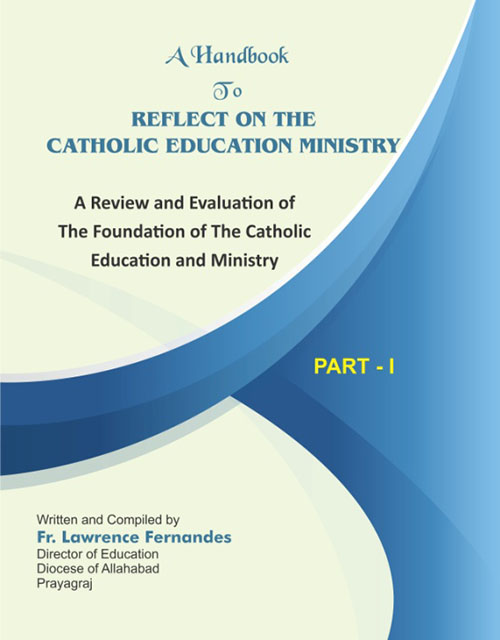
Part II: A Review and Evaluation of the Governance of the Catholic Schools explains how to govern the schools.
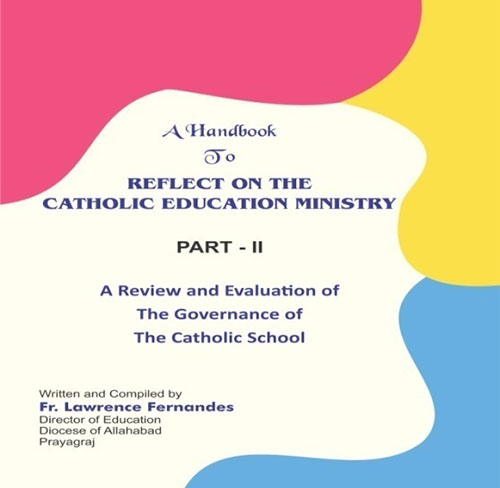
Part III: A Review and Evaluation of the Policies of the Catholic Schools concentrates on various policies of Catholic Schools.
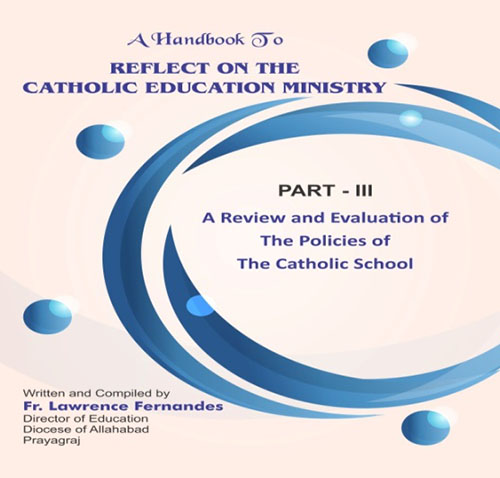
Part IV: A Review and Evaluation of the Day-to-day Role of an Education Administrator of Catholic School. This book contains practical suggestions as to how a school administrator must function on a day to day basis.
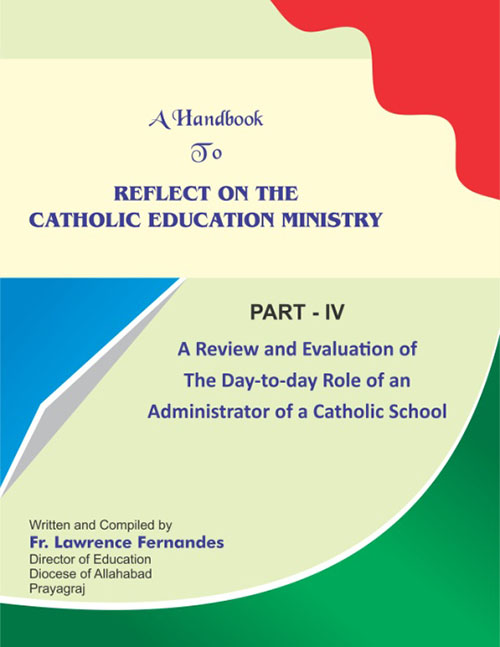
Part V: Administrative Guide
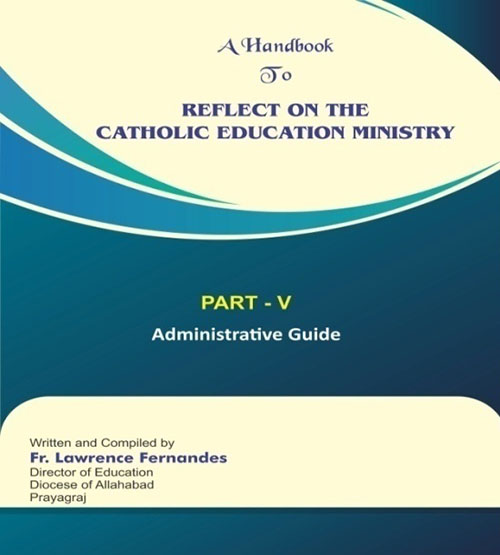
The Administrative Guide covers up all most all the issues related to the day-to-day school administration. This Guide codifies official policies and guidelines for the schools. This Guide serves as a reference and resource guide to administrators, staff, students, parents and school community.
 Write Comment |
Write Comment |  E-Mail To a Friend |
E-Mail To a Friend |
 Facebook |
Facebook |
 Twitter |
Twitter |
 Print
Print 


















